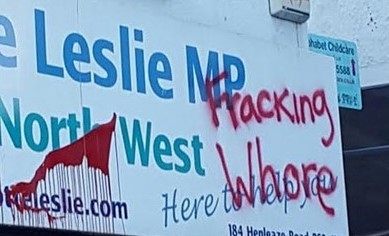A survey commissioned by environmental group Greenpeace has spectacularly backfired as it revealed that more people support fracking than oppose it.
The group, supported by Green party MP Caroline Lucas, tried to bury the inconvenient result of the report in the foot note of a press release.
The overall findings from the survey confirmed that 42 per cent of people supported fracking, while 35 per cent of people oppose it – results which are awkward for Greenpeace because they have inadvertently shown more people support the extraction process than even government estimates.
Instead, the group chose to focus on other details from the survey, saying that fracking could be a significant issue in key marginals and hid the headline figure in the footnote of a press release which has now been removed from their website.
They sent out the news release stating that 31 per cent of voters had said they would be less likely to vote for a candidate who supported fracking, compared with 13 per cent who would be more likely to, saying parties would lose more votes than they stood to gain by supporting it.
According to the Department of Energy and Climate Change’s latest Public Attitudes Tracker published in February, 24 per cent of people said they supported shale gas extraction, with 23 per cent against and half undecided.
Asking the sample whether they supported fracking, which it described as ‘natural gas is extracted . . . by drilling a hole, creating a tiny explosion to fracture the rock and then injecting water, sand and chemicals at high pressure to allow gas to be released’ polling company ComRes found that men were almost twice as likely as women to be in favour of the process which could remove the pressure on the country’s energy input needs.
Support was highest among people aged 65 and over, at 58 per cent – the generation who experienced the OPEC oil crisis and blackouts of the 1970s – compared with only 36 per cent among those aged 18 to 24.
Both Greenpeace and Friends of the Earth are asking Parliamentary candidates to sign a ‘frack-free promise’ ahead of the General Election, something which no Tory hopefuls have done so far compared with a hundred Labour, 104 Lib Dems and even seven UKIP candidates who have. And a total of 402 Green candidates have signed up, meaning that either the party has not managed to reach its target of fielding candidates in 75 per cent of constituencies or not all of the party’s candidates have supported the pledge.
Ken Cronin, chief executive of UK Onshore Oil and Gas, the fracking industry body, said that “when presented with the facts about the safety and low environmental impact of shale gas operations, British people will support onshore oil and gas exploration.”
Greenpeace refuted claims it did not publish the findings, saying, “We did put them in our release and they are publicly available.”

COMMENTS
Please let us know if you're having issues with commenting.